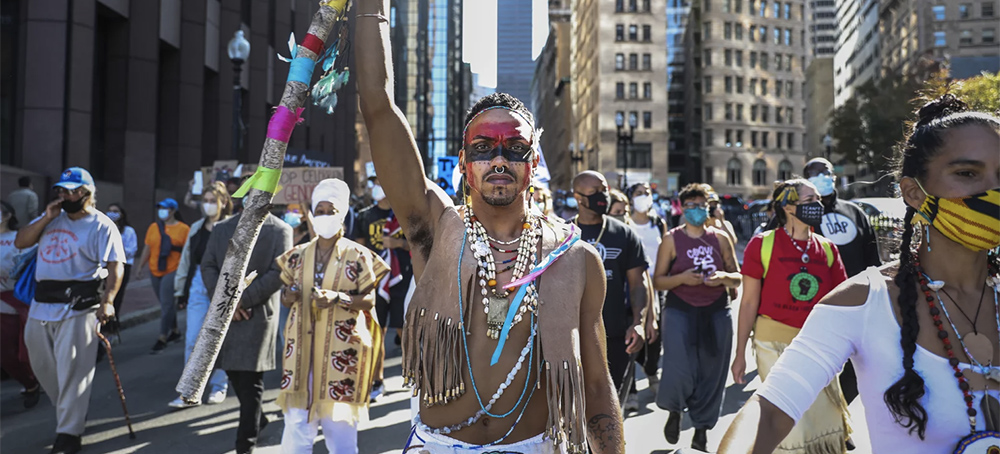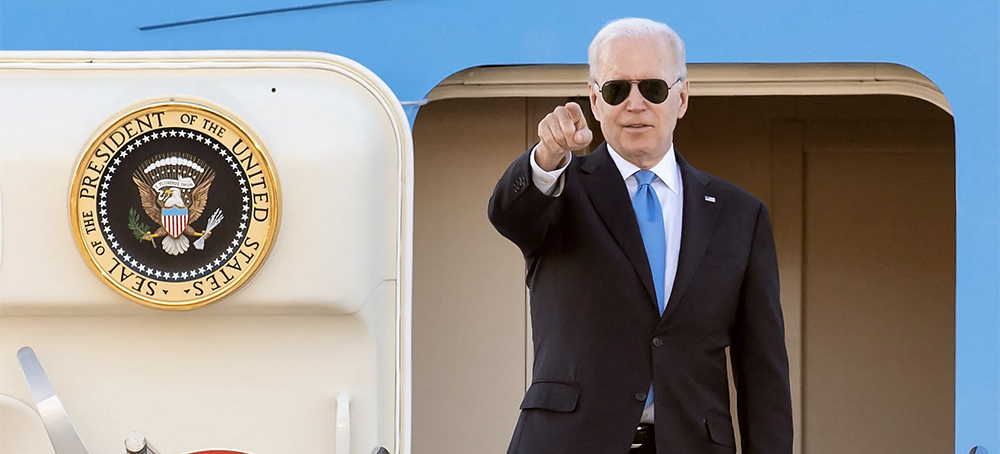Live on the homepage now!
Reader Supported News
The new president laughs in the face of the old president’s “executive privilege.”
Only, as Trump may or may not know, he’s no longer president, and therefore he has no executive privilege to assert. Instead, there’s a new president in the White House, and that guy? Says the documents are going to Congress!
Per The Washington Post:
President [Joe] Biden rejected former president Donald Trump’s request to block documents from the House committee investigating the Jan. 6 attack on the Capitol, the White House said on Friday, likely setting up a legal and political battle. Trump has claimed executive privilege in seeking to evade the committee’s demands for details about Trump and his aides’ activities during the Jan. 6 attack. But in the letter to the National Archives and Records Administration, the White House said Biden “determined that an assertion of executive privilege is not in the best interests of the United States.”
At a White House briefing, press secretary Jen Psaki said the Biden decision reflected the gravity of the attack. “The president’s dedicated to ensuring that something like that could never happen again, which is why the administration is cooperating with ongoing investigations,” Psaki said. “The president has determined that an assertion of executive privilege is not warranted for the first set of documents from the Trump White House that have been provided to us by the National Archives.”
Biden’s decision came after Trump told four former advisers, according to Politico, not to comply with congressional subpoenas, and former White House strategist Stephen Bannon told the committee he won’t be responding to its requests for documents. According to the Post, former chief of staff Mark Meadows and national security aide Kash Patel are said to be “engaging with the committee,” despite President Trump’s demands. “While Mr. Meadows and Mr. Patel are, so far, engaging with the Select Committee, Mr. Bannon has indicated that he will try to hide behind vague references to privileges of the former President,” the committee’s leaders said in a statement released Friday. The committee added that it is considering holding Bannon in criminal contempt. (For his part, Bannon knows a little something about running afoul of the law. In August 2020, he was arrested and charged with conspiracy to commit wire fraud and money laundering for allegedly scamming thousands of border-wall donors. He pleaded not guilty and, naturally, was pardoned by Trump before going to trial. Separately, in November 2020, Bannon was permanently kicked off of Twitter after suggesting Dr. Anthony Fauci and FBI director Christopher Wray should be beheaded.)
Biden’s decision triggers at least a 30-day window for Trump to challenge the call in court before the documents are released, which he no doubt will. On the Hill, members of the committee investigating the insurrection have pledged to take a hard line with anyone refusing to cooperate with the probe. “This is a matter of the utmost seriousness, and we need to consider the full panoply of enforcement sanctions available to us,” said Rep. Jamie Raskin. “And that means criminal contempt citations, civil contempt citations and the use of Congress’s own inherent contempt powers.”
 Protesters marched in an Indigenous Peoples Day rally in Boston on Oct. 10, 2020, as part of a demonstration to change Columbus Day to Indigenous Peoples' Day. Boston made that change last week. (photo: Erin Clark/Boston Globe/Getty Images)
Protesters marched in an Indigenous Peoples Day rally in Boston on Oct. 10, 2020, as part of a demonstration to change Columbus Day to Indigenous Peoples' Day. Boston made that change last week. (photo: Erin Clark/Boston Globe/Getty Images)
President Biden issued a proclamation on Friday to observe this Oct. 11 as a day to honor Native Americans, their resilience and their contributions to American society throughout history, even as they faced assimilation, discrimination and genocide spanning generations. The move shifts focus from Columbus Day, the federal holiday celebrating Christopher Columbus, which shares the same date as Indigenous Peoples' Day this year.
Dylan Baca, a 19-year-old Arizonan who was instrumental in helping broker the proclamation, is overwhelmed by the gravity of Biden's action.
"I still don't think I've fully absorbed what that has meant," he said. "This is a profound thing the president has done, and it's going to mean a lot to so many people."
Four years ago, the Native leader started an organization alongside Arizona state Sen. Jamescita Peshlakai, Indigenous Peoples' Initiative, with a similar mission: to tell a more positive and more accurate tale of Native Americans by replacing Columbus Day with Indigenous Peoples' Day.
What is Indigenous Peoples' Day?
Indigenous Peoples' Day advocates say the recognition helps correct a "whitewashed" American history that has glorified Europeans like Italian explorer Christopher Columbus who have committed violence against Indigenous communities. Native Americans have long criticized the inaccuracies and harmful narratives of Columbus' legacy that credited him with his "discovery" of the Americas when Indigenous people were there first.
"It is difficult to grapple with the complete accomplishments of individuals and also the costs of what those accomplishments came at," said Mandy Van Heuvelen, the cultural interpreter coordinator at the Smithsonian's National Museum of the American Indian.
There are no set rules on how one should appreciate the day, said Van Heuvelen, a member of the Cheyenne River Sioux Tribe from South Dakota. It's all about reflection, recognition, celebration and an education.
"It can be a day of reflection of our history in the United States, the role Native people have played in it, the impacts that history has had on native people and communities, and also a day to gain some understanding of the diversity of Indigenous peoples," she said.
The idea was first proposed by Indigenous peoples at a United Nations conference in 1977 held to address discrimination against Natives, as NPR has reported. But South Dakota became the first state to replace Columbus Day with Indigenous Peoples day in 1989, officially celebrating it the following year.
Biden's proclamation signifies a formal adoption of a day that a growing number of states and cities have come to acknowledge. Last week, Boston joined Arizona, Oregon, Texas, Louisiana, Washington, D.C., and several other states in dedicating a second Monday in October to Indigenous Peoples' Day. Native Americans have borne the brunt of the work to make that happen.
Many state and local governments have gone a step further. More than a dozen states and well over 100 cities celebrate the day, with many of them having altogether dropped the holiday honoring Columbus to replace it with Indigenous Peoples' Day.
What might seem to some like a simple name change can lead to real social progress for Indigenous Americans, said Van Heuvelen.
"What these changes accomplish, piece by piece, is visibility for Native people in the United States," she said. "Until Native people are or are fully seen in our society and in everyday life, we can't accomplish those bigger changes. As long as Native people remain invisible, it's much more easier for people to look past those real issues and those real concerns within those communities."
What about Columbus Day?
Columbus Day remains a federal holiday that gives federal government employees the day off from work.
The day was first founded as a way to appreciate the mistreatment of Italian Americans, and Congress eventually made it a federal holiday in 1934.
"Italian American culture is important, and I think there are other times and places to recognize that. But I think it's also important to also recognize the history of Columbus Day itself," said Baca. "Should we recognize a man whose labors killed children, killed women and decimated the Native American population here? I don't think that is something that we want to be honored."
Monday marks Oregon's first statewide recognition of Indigenous Peoples' Day, in place of Columbus Day, after its legislature passed a bill brought by its Indigenous lawmakers. Rep. Tawna Sanchez, one of those lawmakers, says the movement to recognize the day is an ideal time to capitalize on the momentum of political recognition.
"I don't know that we'll ever get to a place where people have their land back or have the recognition of who they are, to the degree that we that we need to or should. But the fact that people are paying attention at this very moment — that's important, because we will have a greater opportunity to educate people and help them understand why we are where we are right now," she said.
"History is always written by the conqueror," said Sanchez. "How do we actually tell the truth about what happened and where we sit this very moment? How do we go forward from here?"
Follow us on facebook and twitter!
PO Box 2043 / Citrus Heights, CA 95611


